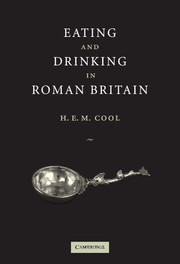Book contents
- Frontmatter
- Contents
- List of figures
- List of tables
- Preface
- Acknowledgements
- Chapter 1 Apéritif
- Chapter 2 The food itself
- Chapter 3 The packaging
- Chapter 4 The human remains
- Chapter 5 Written evidence
- Chapter 6 Kitchen and dining basics: techniques and utensils
- Chapter 7 The store cupboard
- Chapter 8 Staples
- Chapter 9 Meat
- Chapter 10 Dairy products
- Chapter 11 Poultry and eggs
- Chapter 12 Fish and shellfish
- Chapter 13 Game
- Chapter 14 Greengrocery
- Chapter 15 Drink
- Chapter 16 The end of independence
- Chapter 17 A brand-new province
- Chapter 18 Coming of age
- Chapter 19 A different world
- Chapter 20 Digestif
- Appendix: Data sources for tables
- References
- Index
Chapter 11 - Poultry and eggs
Published online by Cambridge University Press: 22 September 2009
- Frontmatter
- Contents
- List of figures
- List of tables
- Preface
- Acknowledgements
- Chapter 1 Apéritif
- Chapter 2 The food itself
- Chapter 3 The packaging
- Chapter 4 The human remains
- Chapter 5 Written evidence
- Chapter 6 Kitchen and dining basics: techniques and utensils
- Chapter 7 The store cupboard
- Chapter 8 Staples
- Chapter 9 Meat
- Chapter 10 Dairy products
- Chapter 11 Poultry and eggs
- Chapter 12 Fish and shellfish
- Chapter 13 Game
- Chapter 14 Greengrocery
- Chapter 15 Drink
- Chapter 16 The end of independence
- Chapter 17 A brand-new province
- Chapter 18 Coming of age
- Chapter 19 A different world
- Chapter 20 Digestif
- Appendix: Data sources for tables
- References
- Index
Summary
INTRODUCTION
This chapter will explore the consumption of poultry, regarded here as domesticated birds kept in farmyards, and their eggs. With these categories of foodstuff, we return to an area where direct evidence survives. It requires there to have been a systematic sampling programme for that evidence to be recovered in a reliable way, especially in the case of eggshell. These birds, especially domestic fowl, were not only sources of food, they also had a symbolic role in religion. There is some evidence too, that they were more likely to be eaten by certain sectors of the community, than by others. The pattern of their consumption is a very useful tool for exploring Romano-British society, and is likely to become even more valuable as the results of routine sampling become available.
THE BIRDS
The domestic birds kept in Roman Britain were chickens, ducks and geese. In the Mediterranean world during the Roman period, pigeons and doves were deliberately reared as food animals, just as they were to be in Britain during the medieval period. Though these birds appear to have been introduced into Roman Britain, there is little evidence that they were a common food item. The first evidence for the domestic fowl (Gallus gallus) in Britain occurs in late Iron Age contexts; and it was deliberately bred for food, cock fighting and religious purposes. The ducks and geese present on Romano-British sites were a mixture of domestic and wild animals.
- Type
- Chapter
- Information
- Eating and Drinking in Roman Britain , pp. 98 - 103Publisher: Cambridge University PressPrint publication year: 2006



